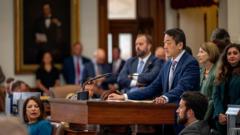Over lunch at the University of Texas at Austin, a Chinese professor and two students expressed their dismay over Secretary of State Marco Rubio’s directive to “aggressively revoke” visas for Chinese nationals studying in “critical fields.” The conversation highlighted the implications of a proposed Republican bill focused on banning Chinese student visas.
Professor Xiaobo Lü elaborated on the burgeoning concerns. “Even if these measures do not materialize, the uncertainty they create has profoundly affected Chinese students' decisions to study in the U.S.,” he stated.
Two students at the table, who chose to remain anonymous for fear of their visa status, explained their realizations of potential repercussions. One student declined offers from prominent journalism schools in favor of the University of Hong Kong, while another rejected an opportunity at MIT to pursue a less prestigious local job instead. Furthermore, a friend at Johns Hopkins University was contemplating returning home before completing his degree.
Their experiences were echoed by a senior academic official from the University of Texas, who noted a drop in applications from promising graduate candidates from China. This official, too, spoke anonymously due to concerns about retaliation.
As these policy discussions unfold, the fear among Chinese students continues to grow. The discourse on visa policies often lacks refinement, with critics arguing that such blunt measures hinder the nuanced solutions needed to address the complexities of international education and ongoing geopolitical tension.




















